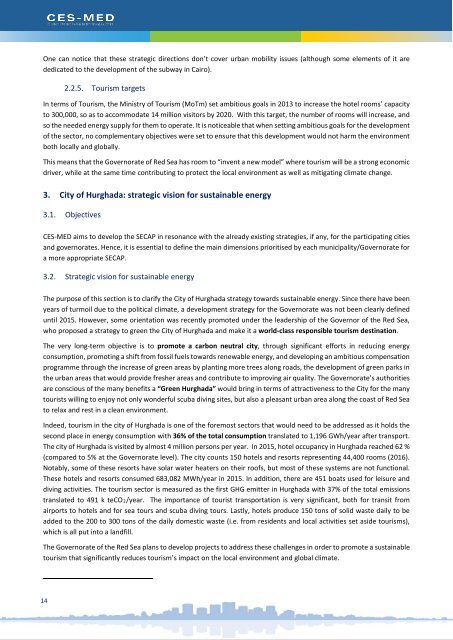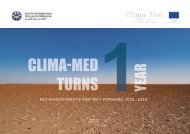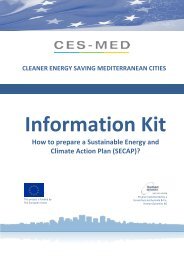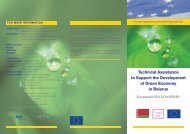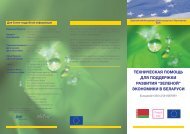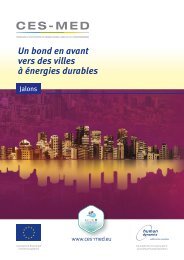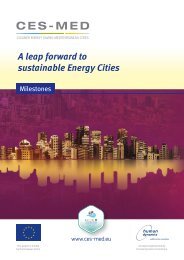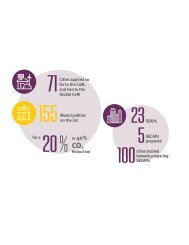020318_Hurghada SECAP_FINAL
You also want an ePaper? Increase the reach of your titles
YUMPU automatically turns print PDFs into web optimized ePapers that Google loves.
One can notice that these strategic directions don’t cover urban mobility issues (although some elements of it are<br />
dedicated to the development of the subway in Cairo).<br />
2.2.5. Tourism targets<br />
In terms of Tourism, the Ministry of Tourism (MoTm) set ambitious goals in 2013 to increase the hotel rooms’ capacity<br />
to 300,000, so as to accommodate 14 million visitors by 2020. With this target, the number of rooms will increase, and<br />
so the needed energy supply for them to operate. It is noticeable that when setting ambitious goals for the development<br />
of the sector, no complementary objectives were set to ensure that this development would not harm the environment<br />
both locally and globally.<br />
This means that the Governorate of Red Sea has room to “invent a new model” where tourism will be a strong economic<br />
driver, while at the same time contributing to protect the local environment as well as mitigating climate change.<br />
3. City of <strong>Hurghada</strong>: strategic vision for sustainable energy<br />
3.1. Objectives<br />
CES-MED aims to develop the <strong>SECAP</strong> in resonance with the already existing strategies, if any, for the participating cities<br />
and governorates. Hence, it is essential to define the main dimensions prioritised by each municipality/Governorate for<br />
a more appropriate <strong>SECAP</strong>.<br />
3.2. Strategic vision for sustainable energy<br />
The purpose of this section is to clarify the City of <strong>Hurghada</strong> strategy towards sustainable energy. Since there have been<br />
years of turmoil due to the political climate, a development strategy for the Governorate was not been clearly defined<br />
until 2015. However, some orientation was recently promoted under the leadership of the Governor of the Red Sea,<br />
who proposed a strategy to green the City of <strong>Hurghada</strong> and make it a world-class responsible tourism destination.<br />
The very long-term objective is to promote a carbon neutral city, through significant efforts in reducing energy<br />
consumption, promoting a shift from fossil fuels towards renewable energy, and developing an ambitious compensation<br />
programme through the increase of green areas by planting more trees along roads, the development of green parks in<br />
the urban areas that would provide fresher areas and contribute to improving air quality. The Governorate’s authorities<br />
are conscious of the many benefits a “Green <strong>Hurghada</strong>” would bring in terms of attractiveness to the City for the many<br />
tourists willing to enjoy not only wonderful scuba diving sites, but also a pleasant urban area along the coast of Red Sea<br />
to relax and rest in a clean environment.<br />
Indeed, tourism in the city of <strong>Hurghada</strong> is one of the foremost sectors that would need to be addressed as it holds the<br />
second place in energy consumption with 36% of the total consumption translated to 1,196 GWh/year after transport.<br />
The city of <strong>Hurghada</strong> is visited by almost 4 million persons per year. In 2015, hotel occupancy in <strong>Hurghada</strong> reached 62 %<br />
(compared to 5% at the Governorate level). The city counts 150 hotels and resorts representing 44,400 rooms (2016).<br />
Notably, some of these resorts have solar water heaters on their roofs, but most of these systems are not functional.<br />
These hotels and resorts consumed 683,082 MWh/year in 2015. In addition, there are 451 boats used for leisure and<br />
diving activities. The tourism sector is measured as the first GHG emitter in <strong>Hurghada</strong> with 37% of the total emissions<br />
translated to 491 k teCO2/year. The importance of tourist transportation is very significant, both for transit from<br />
airports to hotels and for sea tours and scuba diving tours. Lastly, hotels produce 150 tons of solid waste daily to be<br />
added to the 200 to 300 tons of the daily domestic waste (i.e. from residents and local activities set aside tourisms),<br />
which is all put into a landfill.<br />
The Governorate of the Red Sea plans to develop projects to address these challenges in order to promote a sustainable<br />
tourism that significantly reduces tourism’s impact on the local environment and global climate.<br />
14


